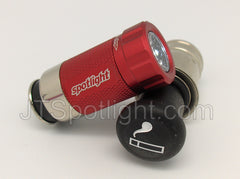 They're going out of business! It's a liquidation sale! The prices will be crazy marked down, right? Not necessarily. Read on to avoid getting ripped off by liquidators. Photo by Cosmic Kitty.
They're going out of business! It's a liquidation sale! The prices will be crazy marked down, right? Not necessarily. Read on to avoid getting ripped off by liquidators. Photo by Cosmic Kitty.
Many an unwitting shopper can be lured into a store with an enormous "50% OFF!" sign strung across the storefront. Even more so when the closure of a chain of stores is highly publicized like the recent closure of Circuit City. Unfortunately, the entire process of liquidating the stock of a store is rather deceptive. Walking past the "Everything must go!" signs and picking up a box marked 50% off could actually mean paying full retail.
First, a brief summary of what liquidation is. When a company is facing dire straits or has already hit the wall of bankruptcy they will— either voluntarily or by legal order—try to convert as much of their assets into cold hard cash as possible to pay off debts and hopefully return some money to their stockholders. The process is usually handled by an external company whose sole goal is to turn the pile of assets into profit—and minimize their risk in the process.
What does this mean to you, the consumer? It means that for the first portion of a liquidation sale you'll likely be ripped off. Let's use an HDTV from a fictitious company to illustrate how you're not actually getting the deep discount you think you are.
 Last year SuperPow television company released the SuperPow H9000 HDTV. The manufacturer suggested retail price (MSRP) was $2500. It was sold at HappyBox electronics stores for $2200 when it first came out and as newer models arrived it was eventually sold for $1250. HappyBox has a bad run and ends up filing for bankruptcy. Their inventory is now controlled by a liquidation company. The company responsible for the liquidation advertises that products in the store are deeply discounted, some things are even 50% off already! You walk in to check on the SuperPow H9000 and see that the price is $1250. You remember the TV was really expensive and that seems like a great deal for a nice TV, after all it's 50% off! The only problem is that you're getting 50% off the MSRP, which nobody paid even when the TV was the hottest model on the market. It may be a month or two into a large liquidation before that TV is actually marked down 50% from the actual street value to a wallet-friendly $625—and most likely someone not realizing they aren't getting a very good deal would have bought it well before that. Photo by mobil'homme.
Last year SuperPow television company released the SuperPow H9000 HDTV. The manufacturer suggested retail price (MSRP) was $2500. It was sold at HappyBox electronics stores for $2200 when it first came out and as newer models arrived it was eventually sold for $1250. HappyBox has a bad run and ends up filing for bankruptcy. Their inventory is now controlled by a liquidation company. The company responsible for the liquidation advertises that products in the store are deeply discounted, some things are even 50% off already! You walk in to check on the SuperPow H9000 and see that the price is $1250. You remember the TV was really expensive and that seems like a great deal for a nice TV, after all it's 50% off! The only problem is that you're getting 50% off the MSRP, which nobody paid even when the TV was the hottest model on the market. It may be a month or two into a large liquidation before that TV is actually marked down 50% from the actual street value to a wallet-friendly $625—and most likely someone not realizing they aren't getting a very good deal would have bought it well before that. Photo by mobil'homme.
How can you make sure you're not the sucker that the liquidators count on to reap their profit? With a little knowledge and some handy tools, you'll get the most for your money.
Know The Market
 Don't go shopping blind. If you're heading to a going-out-of-business sale, take a few minutes to do some cursory research on whatever it is you're looking to buy. Compare prices with price comparison engines like BeatMyPrice and make sure to check out deal-tracking forums like SlickDeals and FatWallet—both were reader favorites for finding the best deals online. You may not even know the exact model you're going to find at the store, but checking deal sites like FatWallet will give you an idea what the general price ranges are for things and what deals can be had on them. A 40" HDTV "marked down" to $1500 won't look so appealing when you know that similar models are going for half that thanks to a little research. Photo by Refracted Moments.
Don't go shopping blind. If you're heading to a going-out-of-business sale, take a few minutes to do some cursory research on whatever it is you're looking to buy. Compare prices with price comparison engines like BeatMyPrice and make sure to check out deal-tracking forums like SlickDeals and FatWallet—both were reader favorites for finding the best deals online. You may not even know the exact model you're going to find at the store, but checking deal sites like FatWallet will give you an idea what the general price ranges are for things and what deals can be had on them. A 40" HDTV "marked down" to $1500 won't look so appealing when you know that similar models are going for half that thanks to a little research. Photo by Refracted Moments.
Use Your Phone as a Price Checker
 If you have an internet-enabled phone with you, it's easy to compare prices right in the store. The quickest, if least specific, method is to plug the product name or model number into the mobile version of Google Product Search. If you're without internet access but you can text message, you can take advantage of the Amazon/eBay price-comparison mashup provided by MobSaver. Text the ISBN or UPC code of an item to save@mobsaver.com and it sends you back the current prices on Amazon and eBay. When you're really in a bind you can use—as I've often done—the most analog method and call a friend to run a quick price search online for you. A few minutes pecking on your phone or making a call can save you hundreds. Photo by gabofr.
If you have an internet-enabled phone with you, it's easy to compare prices right in the store. The quickest, if least specific, method is to plug the product name or model number into the mobile version of Google Product Search. If you're without internet access but you can text message, you can take advantage of the Amazon/eBay price-comparison mashup provided by MobSaver. Text the ISBN or UPC code of an item to save@mobsaver.com and it sends you back the current prices on Amazon and eBay. When you're really in a bind you can use—as I've often done—the most analog method and call a friend to run a quick price search online for you. A few minutes pecking on your phone or making a call can save you hundreds. Photo by gabofr.
It's never a good sign when companies are shuttering their windows—for the economy or for the displaced workers—but that doesn't mean you should pay extra for their bad luck. Armed with the tips above you'll never be the sucker paying MSRP for 2007's castoffs. If you have your own learned lessons about liquidation sales, sound off in the comments below and help save your fellow readers some cash.









No comments:
Post a Comment